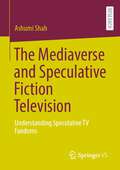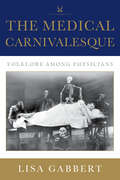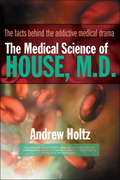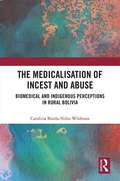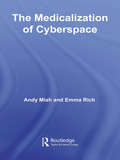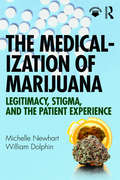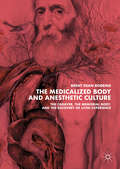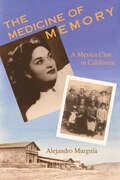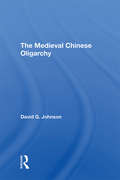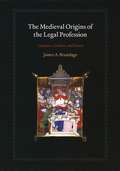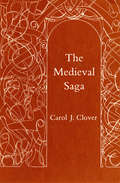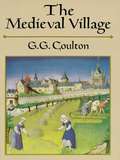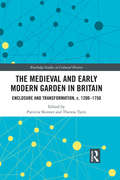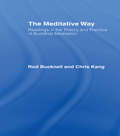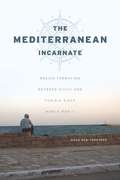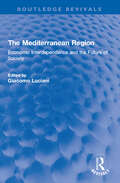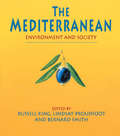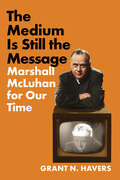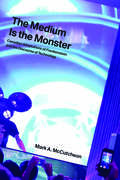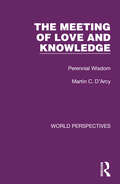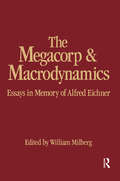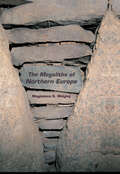- Table View
- List View
The Mediaverse and Speculative Fiction Television: Understanding Speculative TV Fandoms
by Ashumi ShahSome (web) television texts achieve immense commercial success. Certain commercially successful texts boast dedicated, creative, and exponentially growing fandoms. These fan communities engage in specific fan practices that are significantly influenced by the textualities of the texts and their contexts of production, distribution, and consumption. Increased fan engagement resulting in the acceleration of the text’s popularity leads to the following inquiries: · How is the series influenced by the interactions among and the relationships between the producers, consumers, distributors, and content? · What are the sites of these interactions? · What are the social, cultural, economic, and political factors that impact the series? · How do the text’s contexts of production, distribution, and consumption lead to the text’s popularity in mainstream media? In pursuit of an answer to these questions, the analytical lens of the ‘mediaverse’ is developed. An inductive study, this book explores four television series’ that fall within the scope of speculative fiction to characterise the mediaverse and highlight the interconnectedness among the networked nodes of new media. These wield a significant influence on the production and consumption of media and its presence in our everyday lives, thus outlining the mediaverse as a tool for the analysis of a media texts and practices that shape contemporary media culture.
The Medical Carnivalesque: Folklore among Physicians
by Lisa GabbertThe practice of medicine is immersed in issues of life, death, and suffering in relation to the mortal body. Because of this, the medical profession is a fertile arena for folklore that serves to address these topics among physicians.In The Medical Carnivalesque, Lisa Gabbert argues that this extraordinarily difficult work context has led to the development of an occupational corpus of folklore, backstage talk, and humor that she calls the medical carnivalesque. Gabbert argues that suffering is not only something experienced by patients, but that the organization, practice, and ethos of medicine can induce suffering in physicians themselves. Featuring topics such as the institutionalized nature of physician suffering, death-related humor and talk, stories about patient bodies, and parodies of medical specialties, The Medical Carnivalesque shows us how the culture of contemporary medicine uses travesty, humor, and inversion to address the sometimes painful and often transgressive aspects of doctoring. The Medical Carnivalesque connects patient and physician suffering to laughter; acknowledges suffering as an essential component of life; and constitutes a way in which some physicians address the core philosophical and existential issues with which they regularly engage as they go about their daily work.
The Medical Science of House, M.D.
by Andrew HoltzHow can a teenager adopted at birth nearly die because his real mother didn't get a measles shot? How can a husband's faith in his wife's fidelity determine whether radical treatment will cure her or kill her? How can a missed eye doctor appointment reveal a genetic disease? How can doctors choose the right course for a pregnant woman when one may kill her and the other would abort her fetus? Answers to these questions and more are pursued every week on House, M.D. Premiering in November 2004, the darkly quirky medical drama introduced a compelling new character to prime-time television: the sarcastic, abrasive--and brilliant--Dr. Gregory House. Week after week, House has held viewers' attention with brilliant cast performances and intriguing diagnostic mysteries often solved with daring treatments. But how much of the medical detail is real and how much is fabricated? In The Medical Science of House, M.D., Andrew Holtz, a well-known medical journalist, reveals how medical detectives work--how they follow symptoms to their source. He examines each case in detail--and provides answers for every viewer who has ever wondered about the authenticity of their favorite show.
The Medicalisation of Incest and Abuse: Biomedical and Indigenous Perceptions in Rural Bolivia
by Carolina Borda-Niño-WildmanCombining biomedical, psychological, and anthropological approaches to intergenerational incestuous violence experienced by rural indigenous [and] peasant women in the Andean region, this book raises new questions surrounding humanness and the normalisation of sexual violence. Through original ethnographical research, the author analyses Andean understandings of incest, medical positivist practices, as well as the psychiatric ‘treatment’ of incestuous and gender-based violence. <P><P> The book examines the implications that psychiatric institutionalisation within the context of interethnic, gender, and class schemes, has on what it means to be human. It also draws on a theoretical framework in order to understand how discourses shape, and are simultaneously problematized by individual experiences of sexual violence and incest. Intergenerational incestuous violence against women is not necessarily an exceptional event, but can be an ordinary process, one where through the articulation of biomedical and indigenous medicine, as well as indigenous and mestizo forms of administration of political power, women as subjects can become possible. <P><P> This book will appeal to scholars and students with an interest in gender-based violence, as well as mental-health practitioners and academics in Latin American studies, anthropology, gender studies, and sociology.
The Medicalization of Cyberspace
by Andy Miah Emma RichThe entire infrastructure and culture of medicine is being transformed by digital technology, the Internet and mobile devices. Cyberspace is now regularly used to provide medical advice and medication, with great numbers of sufferers immersing themselves within virtual communities. What are the implications of this medicalization of cyberspace for how people make sense of health and identity? The Medicalization of Cyberspace is the first book to explore the relationship between digital culture and medical sociology. It examines how technology is redefining expectations of and relationships with medical culture, addressing the following questions: How will the rise of digital communities affect traditional notions of medical expertise? What will the medicalization of cyberspace mean in a new era of posthuman enhancements? How should we regard hype and exaggeration about science in the media and how can this encourage public engagement with bioethics? This book looks at the complex interactions between health, medicalization, cyberculture, the body and identity. It addresses topical issues, such as medical governance, reproductive rights, eating disorders, Web 2.0, and perspectives on posthumanism. It is essential reading for healthcare professionals and social, philosophical and cultural theorists of health.
The Medicalization of Marijuana: Legitimacy, Stigma, and the Patient Experience
by Michelle Newhart William DolphinMedical marijuana laws have spread across the U.S. to all but a handful of states. Yet, eighty years of social stigma and federal prohibition creates dilemmas for patients who participate in state programs. The Medicalization of Marijuana takes the first comprehensive look at how patients negotiate incomplete medicalization and what their experiences reveal about our relationship with this controversial plant as it is incorporated into biomedicine. Is cannabis used similarly to other medicines? Drawing on interviews with midlife patients in Colorado, a state at the forefront of medical cannabis implementation, this book explores the practical decisions individuals confront about medical use, including whether cannabis will work for them; the risks of registering in a state program; and how to handle questions of supply, dosage, and routines of use. Individual stories capture how patients redefine and reclaim cannabis use as legitimate—individually and collectively—and grapple with an inherently political identity. These experiences help illustrate how stigma, prejudice, and social change operate. By positioning cannabis use within sociological models of medical behavior, Newhart and Dolphin provide a wide-reaching, theoretically informed analysis of the issue that expands established concepts and provides new insight on medical cannabis and how state programs work.
The Medicalized Body and Anesthetic Culture: The Cadaver, The Memorial Body, And The Recovery Of Lived Experience
by Brent Dean RobbinsThis book examines how modern medicine’s mechanistic conception of the body has become a defense mechanism to cope with death anxiety. Robbins draws from research on the phenomenology of the body, the history of cadaver dissection, and empirical research in terror management theory to highlight how medical culture operates as an agent which promotes anesthetic consciousness as a habit of perception. In short, modern medicine’s comportment toward the cadaver promotes the suppression of the memory of the person who donated their body. This suppression of the memorial body comes at the price of concealing the lived, experiential body of patients in medical practice. Robbins argues that this style of coping has influenced Western culture and has helped to foster maladaptive patterns of perception associated with experiential avoidance, diminished empathy, death denial, and the dysregulation of emotion.
The Medicine Wheel: Earth Astrology
by Sun Bear Wabun Wind"The Medicine Wheel is a springboard of power that will allow you to link up to all the energies of the universe." —Sun BearMillions of people around the world have incorporated Native American philosophy into their everyday lives. Now, with this special 25th anniversary edition of the late Sun Bear's classic bestseller, readers old and new can benefit from the teachings and techniques of the Medicine Wheel. In The Medicine Wheel, Sun Bear and Wabun put forth a whole new system of earth astrology to help guide people not only in their daily living but also in their life paths. In the authors' own words, this book was written to "help all people relate better to our Earth Mother...and find a kinship with the universe." The Medicine Wheel is a beautiful and inspiring approach to graceful, holistic living in trying modern times. The Medicine Wheel's philosophy is derived from a basic principle known by all people who live close to the earth: Once you fully embrace the elemental forces of nature, you become a part of the whole. Let this book be your first step toward finding peace and prosperity—and your own special place in the circle of life.
The Medicine of Memory: A Mexica Clan in California
by Alejandro MurguíaAn American Book Award winner&’s creative memoir &“traces his own family's history, as well as the long story of Hispanics in America . . . Spirited writing&” (Library Journal). People who live in California deny the past, asserts Alejandro Murguía. In a state where what matters is keeping up with the current trends, fads, or latest computer gizmo, no one has the time, energy, or desire to reflect on what happened last week, much less what happened ten years ago, or a hundred. From this oblivion of memory, he continues, comes a false sense of history, a deluded belief that the way things are now is the way they have always been. In this work of creative nonfiction, Murguía draws on memories—his own and his family&’s reaching back to the eighteenth century—to (re)construct the forgotten Chicano-indigenous history of California. He tells the story through significant moments in California history, including the birth of the mestizo in Mexico, destruction of Indian lifeways under the mission system, violence toward Mexicanos during the Gold Rush, Chicano farm life in the early twentieth century, the Chicano Movement of the 1960s, Chicano-Latino activism in San Francisco in the 1970s, and the current rebirth of Chicano-Indio culture. Rejecting the notion that history is always written by the victors, and refusing to be one of the vanquished, he records, and draws us into, his own California history.
The Medieval Chantry in England (The British Archaeological Association Conference Transactions)
by Julian M. LuxfordChantries were religious institutions endowed with land, goods and money. At their heart was the performance of a daily mass for the spiritual benefit of their founders, and the souls of all faithful dead. To Church reformers, they exemplified some of medieval Catholicism’s most egregious errors; but to the orthodox they offered opportunities to influence what occurred in an unknowable afterlife. The eleven essays presented here lead the reader through the earliest manifestations of the chantry, the origins and development of ‘stone-cage’ chapels, royal patronage of commemorative art and architecture, the chantry in the late medieval parish, the provision of music and textiles, and a series of specific chantries created for William of Wykeham, Edmund Audley, Thomas Spring and Abbot Islip, to the eventual history and the cultural consequences of their suppression in the mid-16th century.
The Medieval Chinese Oliogarchy
by David C JohnsonMost modern scholars recognize that there were great differences between China's ruling elite in the middle and late traditional period; many have called the period up through the T'ang dynasty "aristocratic," in contrast to the more meritocratic and socially mobile age that followed. But until now there has been no serious effort to discover how the social elite was defined in medieval times, and who belonged to it. David Johnson discusses in detail medieval definitions of the social elite, and, with the help of several manuscripts of the ninth century, identifies the families that belonged to that class.
The Medieval Origins of the Legal Profession: Canonists, Civilians, and Courts
by James A. BrundageIn the aftermath of sixth-century barbarian invasions, the legal profession that had grown and flourished during the Roman Empire vanished. Nonetheless, professional lawyers suddenly reappeared in Western Europe seven hundred years later during the 1230s when church councils and public authorities began to impose a body of ethical obligations on those who practiced law. James Brundage’s The Medieval Origins of the Legal Profession traces the history of legal practice from its genesis in ancient Rome to its rebirth in the early Middle Ages and eventual resurgence in the courts of the medieval church. By the end of the eleventh century, Brundage argues, renewed interest in Roman law combined with the rise of canon law of the Western church to trigger a series of consolidations in the profession. New legal procedures emerged, and formal training for proctors and advocates became necessary in order to practice law in the reorganized church courts. Brundage demonstrates that many features that characterize legal advocacy today were already in place by 1250, as lawyers trained in Roman and canon law became professionals in every sense of the term. A sweeping examination of the centuries-long power struggle between local courts and the Christian church, secular rule and religious edict, The Medieval Origins of the Legal Profession will be a resource for the professional and the student alike.
The Medieval Saga
by Carol J. CloverWritten in the thirteenth century, the Icelandic prose sagas, chronicling the lives of kings and commoners, give a dramatic account of the first century after the settlement of Iceland—the period from about 930 to 1050. To some extent these elaborate tales are written versions of traditional sagas passed down by word of mouth. How did they become the long and polished literary works that are still read today?The evolution of the written sagas is commonly regarded as an anomalous phenomenon, distinct from contemporary developments in European literature. In this groundbreaking study, Carol J. Clover challenges this view and relates the rise of imaginative prose in Iceland directly to the rise of imaginative prose on the Continent. Analyzing the narrative structure and composition of the sagas and comparing them with other medieval works, Clover shows that the Icelandic authors, using Continental models, owe the prose form of their writings, as well as some basic narrative strategies, to Latin historiography and to French romance.
The Medieval Village (Cambridge Library Collection - Medieval History Ser.)
by G. G. CoultonRenowned medievalist offers exceptionally detailed, comprehensive and vivid picture of medieval peasant life, including nature of serfdom, manorial customs, village discipline, peasant revolts, the Black Death, justice, tithing, games and dance, much more. Much on exploitation of peasant classes.
The Medieval and Early Modern Garden in Britain: Enclosure and Transformation, c. 1200-1750 (Routledge Studies in Cultural History #58)
by Patricia Skinner Theresa TyersWhat was a "garden" in medieval and early modern British culture and how was it imagined? How did it change as Europe opened up to the wider world from the 16th century onwards? In a series of fresh approaches to these questions, the contributors offer chapters that identify and discuss newly-discovered pre-modern garden spaces in archaeology and archival sources, recognize a gendered language of the garden in fictional descriptions ("fictional" here being taken to mean any written text, regardless of its purpose), and offer new analysis of the uses to which gardens - real and imagined - might be put. Chapters investigate the definitions, forms and functions of physical gardens; explore how the material space of the garden was gendered as a secluded space for women, and as a place of recreation; examine the centrality of garden imagery in medieval Christian culture; and trace the development of garden motifs in the literary and artistic imagination to convey the sense of enclosure, transformation and release. The book uniquely underlines the current environmental "turn" in the humanities, and increasingly recognizes the value of exploring human interaction with the landscapes of the past as a route to health and well-being in the present.
The Meditative Way: Readings in the Theory and Practice of Buddhist Meditation
by Roderick Bucknell Chris KangBuddhist meditation, while attracting less popular attention than some other meditative disciplines, has given rise to a particularly rich literature in recent years. Despite differences in style and terminology, these modern writings on Buddhist meditation serve much the same purposes as did the manuals and commentaries of the classical masters: to explicate and interpret the Buddha's teachings on meditation, to clarify the nature and value of the various meditative techniques and attainments, and/or to offer advice on the actual practice of meditation.Meditators are increasingly inclined to compare and evaluate critically what the different contemporary meditation masters have to say, to weigh up the results of relevant scientific studies, or to consult translations of the primary texts in search of the Buddha's 'original' teachings on meditation. Writers on meditation are also increasingly adopting an appropriately critical approach, particularly as regards the reliability of textual accounts. Relatively few still commit the old error of assuming that the Pali canon is a complete and faithful record of what the Buddha said on the subject, or that the classical commentators were infallible authorities.The present collection of twenty-eight readings is designed to give meditators, researchers, and general readers ready access to representative samples of those writings, and to the principal relevant texts.
The Mediterranean Incarnate: Region Formation between Sicily and Tunisia since World War II
by Naor Ben-YehoyadaIn The Mediterranean Incarnate, anthropologist Naor Ben-Yehoyada takes us aboard the Naumachos for a thirty-seven-day voyage in the fishing grounds between Sicily and Tunisia. He also takes us on a historical exploration of the past eighty years to show how the Mediterranean has reemerged as a modern transnational region. From Sicilian poaching in North African territory to the construction of the TransMediterranean gas pipeline, Ben-Yehoyada examines the transformation of political action, imaginaries, and relations in the central Mediterranean while detailing the remarkable bonds that have formed between the Sicilians and Tunisians who live on its waters. The book centers on the town of Mazara del Vallo, located on the southwestern tip of Sicily some ninety nautical miles northeast of the African shore. Ben-Yehoyada intertwines the town’s recent turbulent history—which has been fraught with conflicts over fishing rights, development projects, and how the Mediterranean should figure in Italian politics at large—with deep accounts of life aboard the Naumacho, linking ethnography with historical anthropology and political-economic analysis. Through this sophisticated approach, he crafts a new viewpoint on the historical processes of transnational region formation, one offered by these moving ships as they weave together new social and political constellations.
The Mediterranean Region: Economic Interdependence and the Future of Society (Routledge Revivals)
by Giacomo LucianiFirst published in 1984, The Mediterranean Region considers the broad economic and political problems facing the region from a variety of perspectives. The book features the work of international experts on the Mediterranean region. It discusses the changing legal environment and covers the Law of the Sea as applied to the Mediterranean, and the position of the Arab countries in the region. Chapters are also devoted to exploring the different policies of Russia, the United States, and Europe, towards the Mediterranean. The Mediterranean Region is a detailed contribution to research and understanding of the area.
The Mediterranean: Environment and Society (Liverpool University Press Ser.)
by Russell King Bernard Smith Lindsay ProudfootThis book addresses contemporary geographical issues in the Mediterranean Basin from a perspective that recognizes the physical characteristics and cultural interactions which link the different Mediterranean states as a recognisable geographic entity. Sixteen chapters each deal with a major geographical issue currently facing the Mediterranean, each providing an invaluable summary of the extensive but widely dispersed literature relating to Mediterranean issues. Particular emphasis is placed on the interaction between society and environment in terms of environmental management, differential regional development and its associated political, demographic, cultural and economic tensions.
The Medium Is Still the Message: Marshall McLuhan for Our Time
by Grant N. HaversThe Medium Is Still the Message presents Marshall McLuhan, history's foremost philosopher of media, as the indispensable guide for understanding the impact of technologies. McLuhan (1911-1980) shows that media are not simply tools of communication: they create new environments with transformational effects on politics, economics, culture, identity, religion, and nature. Grant N. Havers argues that McLuhan's key insight--"the medium is the message"--is even more relevant today as humanity grapples with the unintended effects of new media.As McLuhan demonstrated, a lack of understanding about the power of media technologies allows these entities to become idols that enslave their makers. At the same time, they encourage human beings to act like gods who can reinvent reality itself, all the while leading to the decline of literacy, the weakening of democracy, the resurgence of tribalism within the global village, and the elusive search for identity in cyberspace. The Medium Is Still the Message ultimately offers good news: using McLuhan's insights, human beings can escape the technological cave that they have fashioned for themselves.
The Medium Is the Massage: An Inventory of Effects
by Marshall Mcluhan Quentin FioreFirst published in 1967, this text is now more relevant than ever, as McLuhan's foresights about the impact of new media is actualized at unprecedented speeds via the Internet. It portrays technologies as an extension of man, illustrating how our senses are massaged and our preceptions altered as these devices become integral parts of our lives.
The Medium Is the Monster: Canadian Adaptations of <em>Frankenstein</em> and the Discourse of Technology
by Mark A. McCutcheonTechnology, a word that emerged historically first to denote the study of any art or technique, has come, in modernity, to describe advanced machines, industrial systems, and media. McCutcheon argues that it is Mary Shelley’s 1818 novel Frankenstein that effectively reinvented the meaning of the word for modern English. It was then Marshall McLuhan’s media theory and its adaptations in Canadian popular culture that popularized, even globalized, a Frankensteinian sense of technology. The Medium Is the Monster shows how we cannot talk about technology—that human-made monstrosity—today without conjuring Frankenstein, thanks in large part to its Canadian adaptations by pop culture icons such as David Cronenberg, William Gibson, Margaret Atwood, and Deadmau5. In the unexpected connections illustrated by The Medium Is the Monster, McCutcheon brings a fresh approach to studying adaptations, popular culture, and technology.
The Meeting of Love and Knowledge: Perennial Wisdom (World Perspectives #4)
by Martin C. D'ArcyOriginally published in 1958 and authored by one of the foremost liberal Catholic theologians of the 20th Century, this book recognizes the need for a greater unity of understanding among all faiths and explores these common grounds with insight and sympathy, bringing to Catholics and non-Catholics alike a full measure of the author’s inspiration and judgement.
The Megacorp and Macrodynamics: Essays in Memory of Alfred Eichner
by William MilbergThese essays on Post-Keynesian economics were written expressly for a volume to honour the life and work of Alfred Eichner. The original countributions - that critically examine and extend ideas in Eichner's "The Macrodynamics of Advanced Market Economies" are organized in seven sections that correspond to areas of economics in which Eichner made a significant contribution. Part 1 deals with the megacorp, a theory of firm pricing and investment that was one of Eichner's most important contributions. Issues of productivity and technical change, that lie at the center of Eichner's macrodynamic model, are the focus of part 1 and parts 3 and 4 elaborate on Eichner's work on growth and money and yield insights into the theoretical disagreements among the Post-Keynesians themselves. Part 5 presents a number of examples of non-neo-classical model building. Part 6 opens with a critique of the "new economic history" that leads to other essays on thorny methodological issues confronting Post-Keynesians. Part 7 gives a European perspective on North American Post-Keynesian economics. The essays reveal the relationships between Eichner's work and Institutionalist and Marxian economics. At the same time, the book raises current theoretical conflicts among these groups as well as among Post-Keynesians themselves. This book compliments Alfred S.Eichner's "The Macrodynamics of Advanced Market Economies", also published in 1991, and is appropriate for scholars and upper-level undergraduates and graduate students.
The Megaliths of Northern Europe
by Magdalena MidgleyThe North European megaliths are among the most enduring structures built in prehistory; they are imbued with symbolic meanings which embody physical and conceptual ideas about the nature of the world inhabited by the first Northern farmers. The Megaliths of Northern Europe provides a much needed up-to-date synthesis of the material available on these monuments, incorporating the results of recent research in Holland, Germany, Denmark and Sweden. This research has brought to light new data on the construction of the megaliths and their role in the cultural landscape, and Magdalena Midgley offers a fascinating interpretation of the symbolism of megalithic tombs within the context of early farming communities. This wealth of new evidence suggests the Northern European megaliths were important foci in the wider north-west European context. The construction of dolmens and passage graves, using huge glacial boulders, demanded both great communal effort and considerable skill. In addition to this technical expertise the master builders also made use of their esoteric knowledge of rituals. This was expressed in the use of exotic building materials and special architectural features, and in the placement of tombs within the natural and cultural landscapes, creating new metaphors and images. Fully illustrated, this book will be of interest to both undergraduate and postgraduate students of European Prehistory, Archaeology and Prehistoric Anthropology, as well as architects who study ancient architecture and social anthropologists who study modern megaliths.
